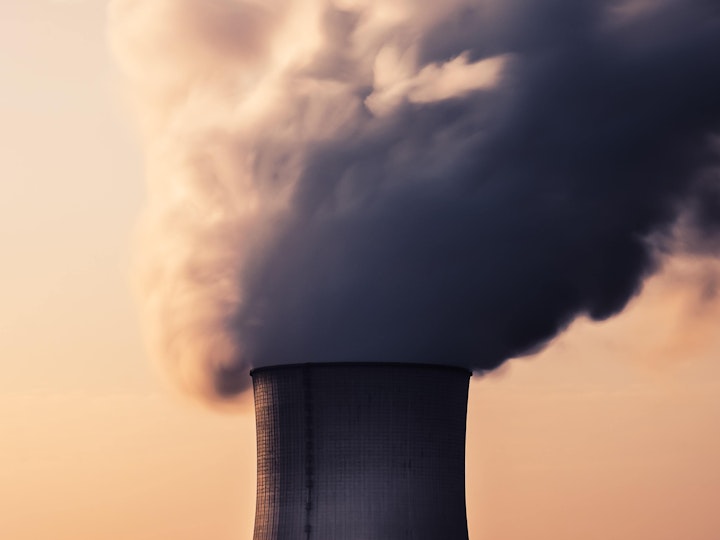Climate emergency: a nuclear solution
Nuclear power is key to ensuring a sustainable way of living for future generations and must not be dismissed by leaders, argues Professor Brian Scott-Quinn.

Government ministers from Germany and four other EU countries recently wrote to the European Commission to argue against the EU Technical Assessment of nuclear power generation. The assessment was with respect to the 'do no significant harm' (DNSH) criteria in the Taxonomy Regulation, a classification system establishing a list of environmentally-sustainable economic activities. This is a critical issue, since any technology that does not meet the DNSH criteria will attract much less private sector investment and hinder progress towards net-zero. The assessment concluded: "The analyses did not reveal any science-based evidence that nuclear energy does more harm to human health or to the environment than other electricity production technologies already included in the Taxonomy."
The current climate emergency
The five countries say that "radioactive waste is an unresolved problem, which is contrary to the agreement not to impose 'unreasonable burdens' on future generations". While there is no substantive evidence for this, there is plenty of real evidence that climate change will impose truly unreasonable burdens. So much so, that Germany’s highest court said recently that its government must update its climate law in response to a challenge by a young woman who argued that rising sea levels would engulf her family farm.
A similar view was taken by a court in Holland earlier this year when the judge ordered Shell to reduce its greenhouse gas emissions 45% by 2030, finding its existing carbon mitigation strategy was "not concrete and is full of conditions." The court also ruled that Shell is responsible for emissions from its customers and suppliers and that Shell’s activities constituted a threat to the “right to life” and “undisturbed family life”.
The IPCC report a few weeks ago warns of a series of thresholds beyond which recovery from climate breakdown may become impossible. It warns: "Life on Earth can recover from a drastic climate shift by evolving into new species and creating new ecosystems … humans cannot." There may not be many more generations that need to be concerned about nuclear waste disposal issues if the governments of the world don’t take every possible step to cut emissions dramatically before 2030 including by use of nuclear to generate heat and power.
Acting now on these judgements by including nuclear in the DNSH category, would help ensure an inter-generational 'Just Transition'.
A nuclear solution
Cutting emissions now requires extending the life of nuclear plants, and substantially increasing nuclear new build. Nuclear is, after all, the major source of clean energy in Europe. It is also symbiotic with the needs of power networks with a high proportion of wind and solar variable renewable energy (VRE) as it is the only substantial source of clean 'firm' power. Without it, and even with existing battery storage, we are likely to suffer power blackouts and brownouts when we have calm weather with cloud cover across the European landmass, particularly at night when solar ceases to work, as battery power is economic only over a maximum four-hour period. Nuclear provides the only possible source of sustainable firm power to replace coal and gas.
Time is ticking
This brings us to the crux of the problem. It needs 'all hands to the pumps' if an irreversible 'tipping point' is to be avoided and every technology will be required to achieve success. Shutting nuclear power plants in Germany, Spain, California and elsewhere will reduce the chances of avoiding this. Stopping the construction of more such plants – in particular the 'new tech', high temperature advanced reactors (Generation IV SMRs) – seems to be folly on a grand scale given the existential crisis that the world faces.
Domestic heating using natural gas is one of the largest sources of CO2 and also methane emissions. The fact that nuclear can provide heat for district heating as well as high temperature heat for industrial processes (whereas wind and solar produce only power in the first instance) and also hydrogen that can make the gas grid clean, makes the need for additional nuclear power all the more urgent. Indeed, the United Nations Economic Commission for Europe in a new technology brief says it must be part of addressing the Paris Agreement and the 2030 Agenda for Sustainable Development. Policies which prioritise climate and sustainable development goals must be technology-neutral to expedite new nuclear development along with other low-carbon technologies. "Analyses indicate that the world’s climate objectives will not be met if nuclear technologies are excluded" is a rather frightening conclusion.
Political inaction
The All-Party Parliamentary Group (APPG) report on nuclear is headed Net Zero Needs Nuclear and says: "New nuclear will play a crucial part in this government’s plans to achieve a secure, low-carbon, affordable energy future." Yet the UK Green Financing Framework shows no real action is to be taken: "recognising that many sustainable investors have exclusionary criteria in place around nuclear energy, the UK Government will not finance any nuclear energy-related expenditures under the Framework". One hand contradicts the other.
Further climate change damage can be minimised, but not if emotional considerations take priority over the reality that future generations may not inherit the Earth unless governments that are emotionally anti-nuclear start to take climate change risk seriously, don’t just mutter the usual ‘Net-Zero by 2050’ slogan but ensure that every technology including nuclear that can help in achieving damage mitigation is put into use.
Professor Brian Scott-Quinn is a pro-bono financing advisor to Penultimate Power UK Ltd which has an interest in the Japanese EnergiHabu HTGR energy hub project.
You might also like
Race and anti-racism in the UK General Election
The ace up the UK’s sleeve: How cheaper imports could spark UK growth through lowering inflation
The UK productivity puzzle: is the answer in consumers’ hands?
This site uses cookies to improve your user experience. By using this site you agree to these cookies being set. You can read more about what cookies we use here. If you do not wish to accept cookies from this site please either disable cookies or refrain from using the site.
